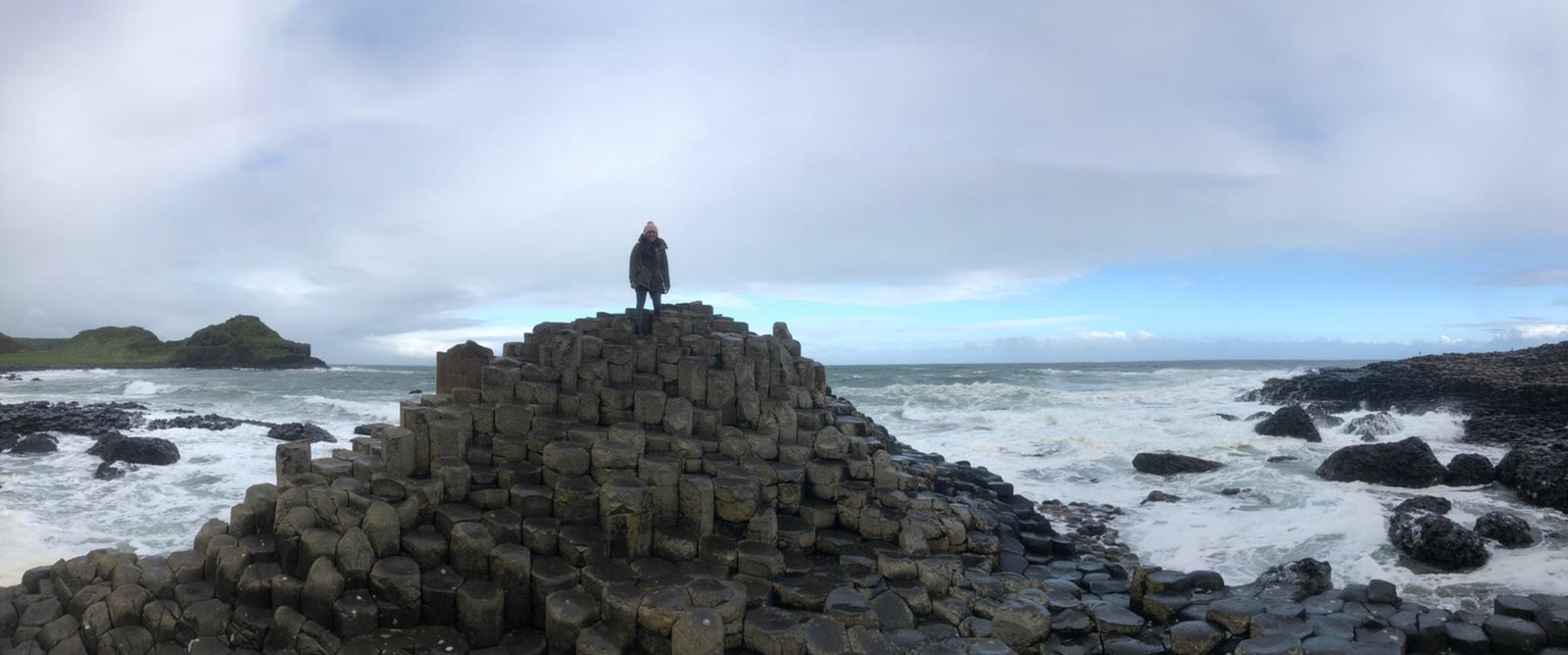Celebrating progress in Palestine, two weeks at Plum Village, and three weeks in London
I’m sitting on the orange-red bench at the bus stop along the Causeway Coast in Northern Ireland, waiting for public transit to Coleraine and on to Belfast. In front of me, a vast green countryside stretches towards rocky cliffs, a white schoolhouse cafe, and the Atlantic Ocean.
This evening in Belfast, I will reunite with Baheyeh, Miriam, and Juliet (all flying in from Tel Aviv) for a weeklong course on resiliency and trauma. After this training in Belfast, I’ll be certified to teach this resiliency course on my own and hope to incorporate its lessons into the trade school I am building.
On that note, my trade school Aida Collective is officially up and running! We graduated the second class of coding students in early August (before I left for Plum Village, London, and Belfast), and now my Palestinian friend and collaborator Orjwan is leading weekly lectures and projects in my absence. With Orjwan I can truly imagine a future for the collective, for her energy and passion for the mission gives me a partner on the ground. Her presence encourages me to build a sustainable foundation for the school that can operate when I’m gone.
Our first two classes have tested and proven the model of a “0-20” program, aimed at Palestinian young adults without access to existing coding programs because of language barriers, poverty, or simply difficulty getting started on their own. We aim to be a bridge between no experience or access (“0”) and other opportunities (“20”), be they the six-month Gaza Sky Geeks program in Khaleel, university study, or our new “Employable” education classes.
This school is our response to the question: What does education for young people look like in a conflict zone? We believe in education that:
- Reduces all barriers to access, including but not limited to: poverty, lack of English fluency, limited mobility, and existing obligations that make job transitions challenging.
- Prioritizes student wellbeing and mental health alongside traditional education.
- Provides trade skills education that allow students to participate in the global economy, allowing them to create lives of self-sufficiency and happiness for themselves and their society.
In practice, this model of education has three tiers:
- Tier 1 offers two foundational courses: the “0-20” program teaching the basics of computing, problem-solving, and Javascript, and an English language program with 1:1 practice sessions.
- Tier 2 teaches self-awareness and compassion in a secular setting, focused on teaching tools for emotional and mental well-being.
- Tier 3 includes our “Employable” skills courses, where we’ll follow up on trades like React/Redux, backend server architecture, APIs and microservices, Wordpress and Wix, entrepreneurship — anything friends are willing and able to teach!
We are committed to providing free access to learning that results in economic sustainability and personal and collective happiness. We aim to serve those marginalized and disadvantaged within Palestinian society, particularly young people.
Orjwan and I are partnering with Anas, the director of operations at the Youth Development Resource Center in Hebron, a hub of innovation that’s also home to the Gaza Sky Geeks program. We intend to host many of our classes in the YDRC space and to leverage their relationships with NGOs and partners in the area.
My primary focus upon returning to Palestine will be building the foundation for the long-term operations and sustainability of Aida Collective, with the hope that my full-time presence and financial support is no longer needed. Thank you to everyone who has supported me in this aspiration: your questions, brainstorming, and love are much appreciated!
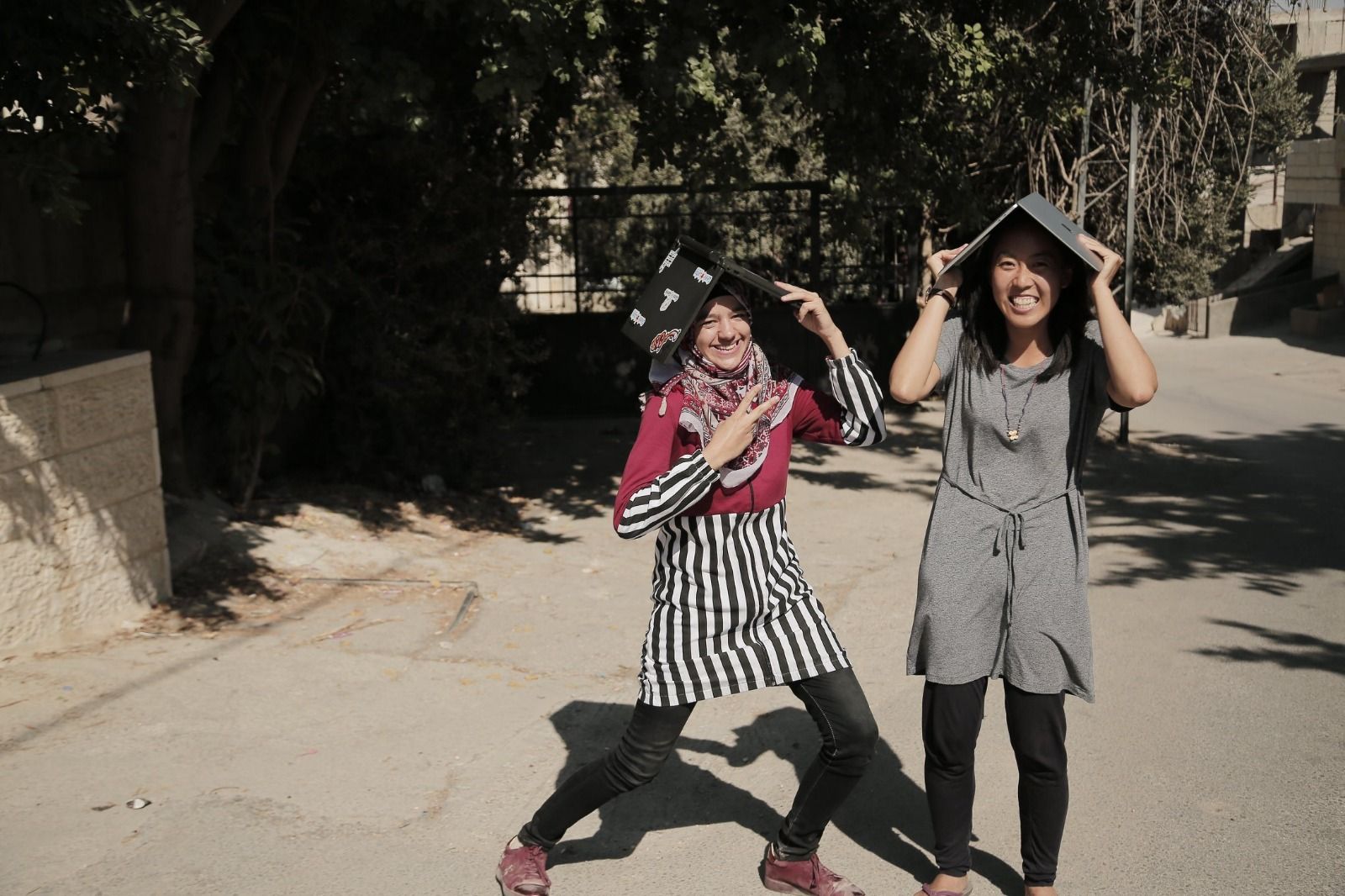
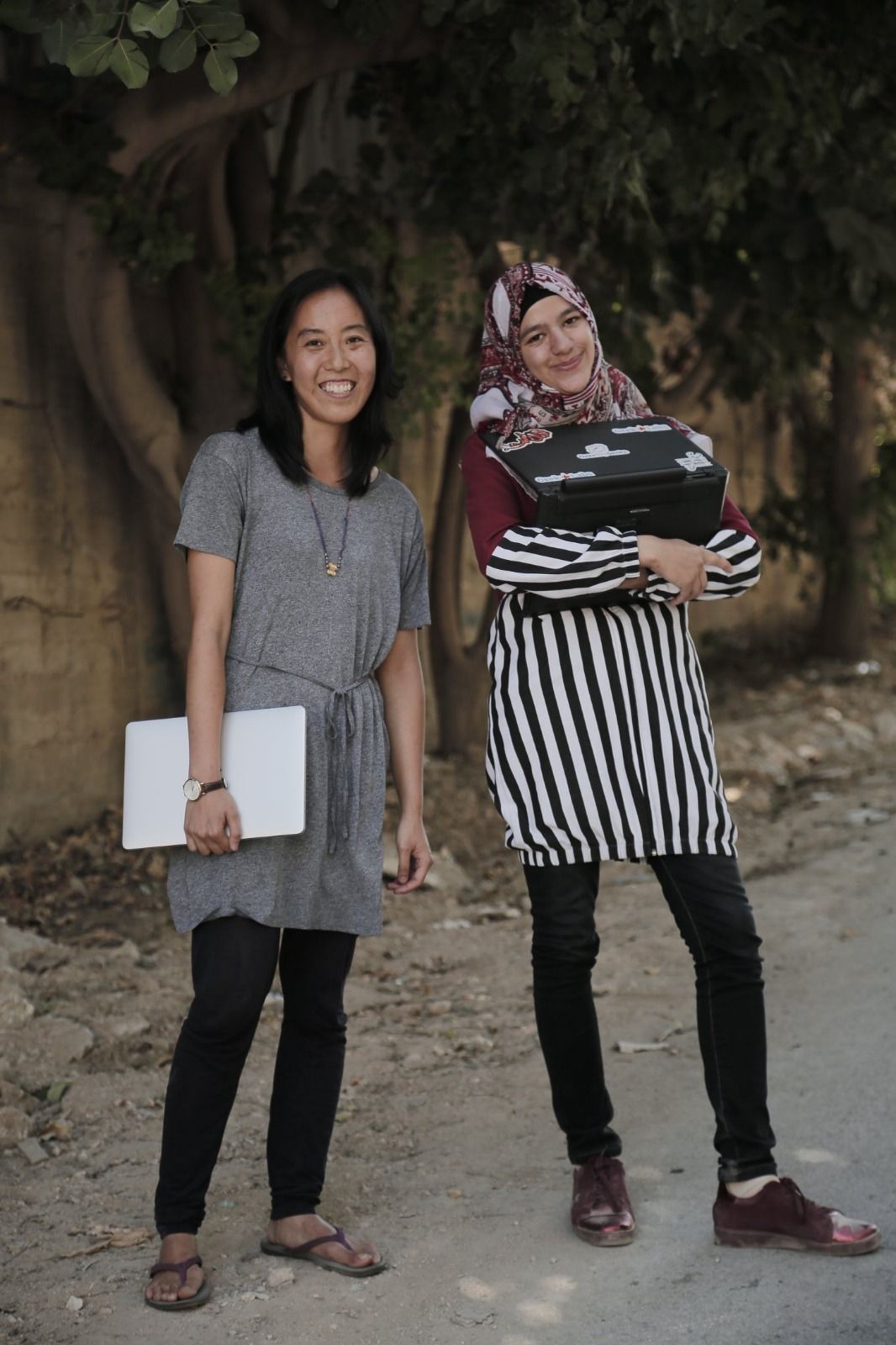
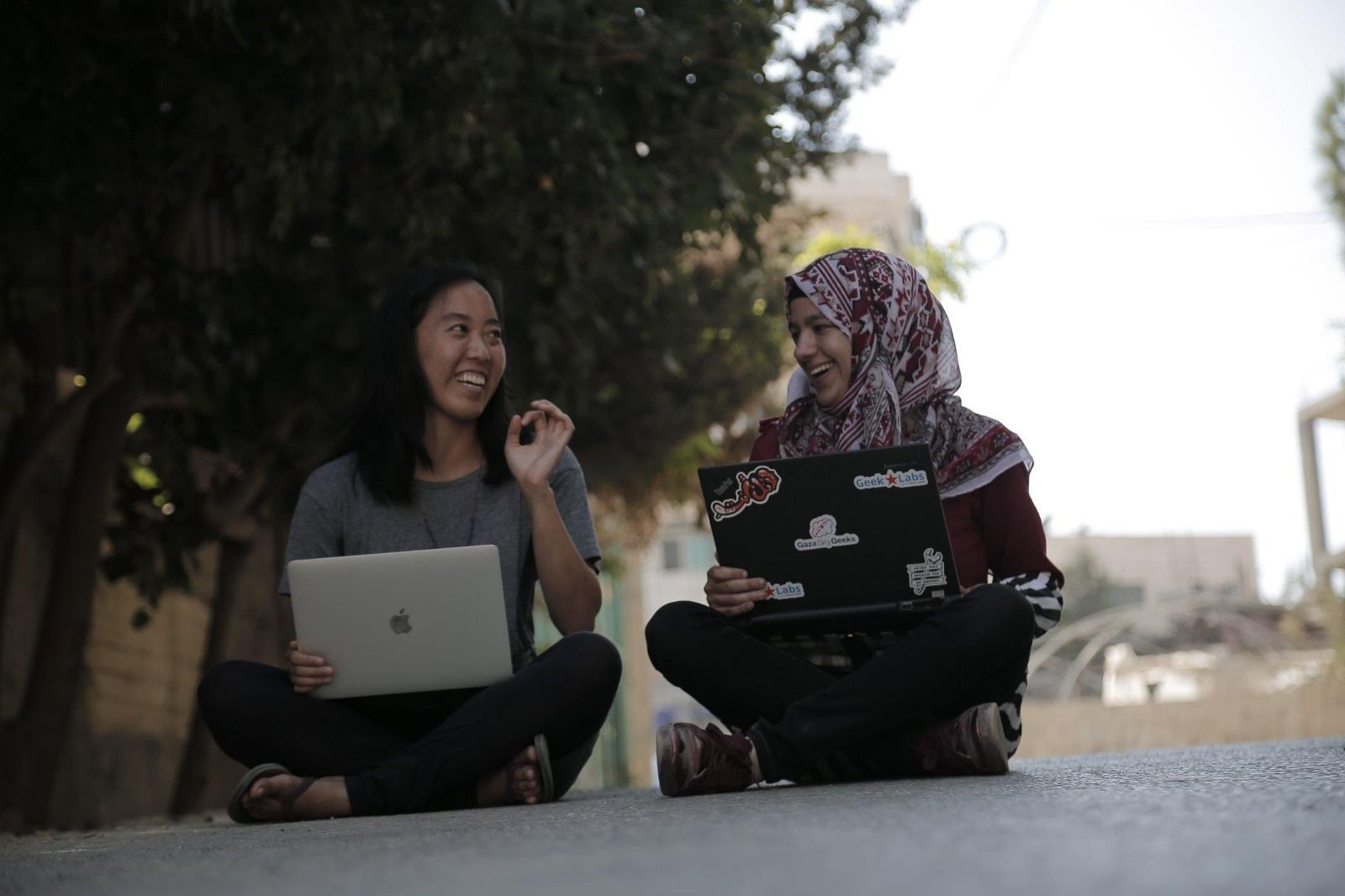
Touching the rainbow and exploring true belonging in Plum Village
My time in Plum Village with eleven Palestinian and three Israeli friends was nourishing and alive. When I arrived and reunited with my friends (traveling from Jordan, Canada, and France at different days and times), I felt an incredible sense of relief and victory. We had done the impossible again, bringing folks from Bethlehem, Hebron, and Nablus to the peaceful haven that is Plum Village. The monastics welcomed us with open arms (and pickup vans late at night), and set up huge tents with mattresses for us to sleep comfortably. There are too many moments of joy to capture everything here, so I’ll just share a few snapshots.
The rainbow family!
I joined the rainbow family, an open space for young people identifying as LGBTQ to meet each other and to be visible. Living in a conservative and religious area in Bethlehem, I’m not often able to be open about my rainbow/queer identity. The invitation to be fully myself in a monastic setting — letting my rainbow joys and sorrows come to light in a safe and nurturing setting — was a breath of fresh air I didn’t know I needed.
In this space, I confronted my fear of loneliness on a non-traditional queer path, explored possibilities for family, and set intentions for building intimacy and belonging within close friendships and community.
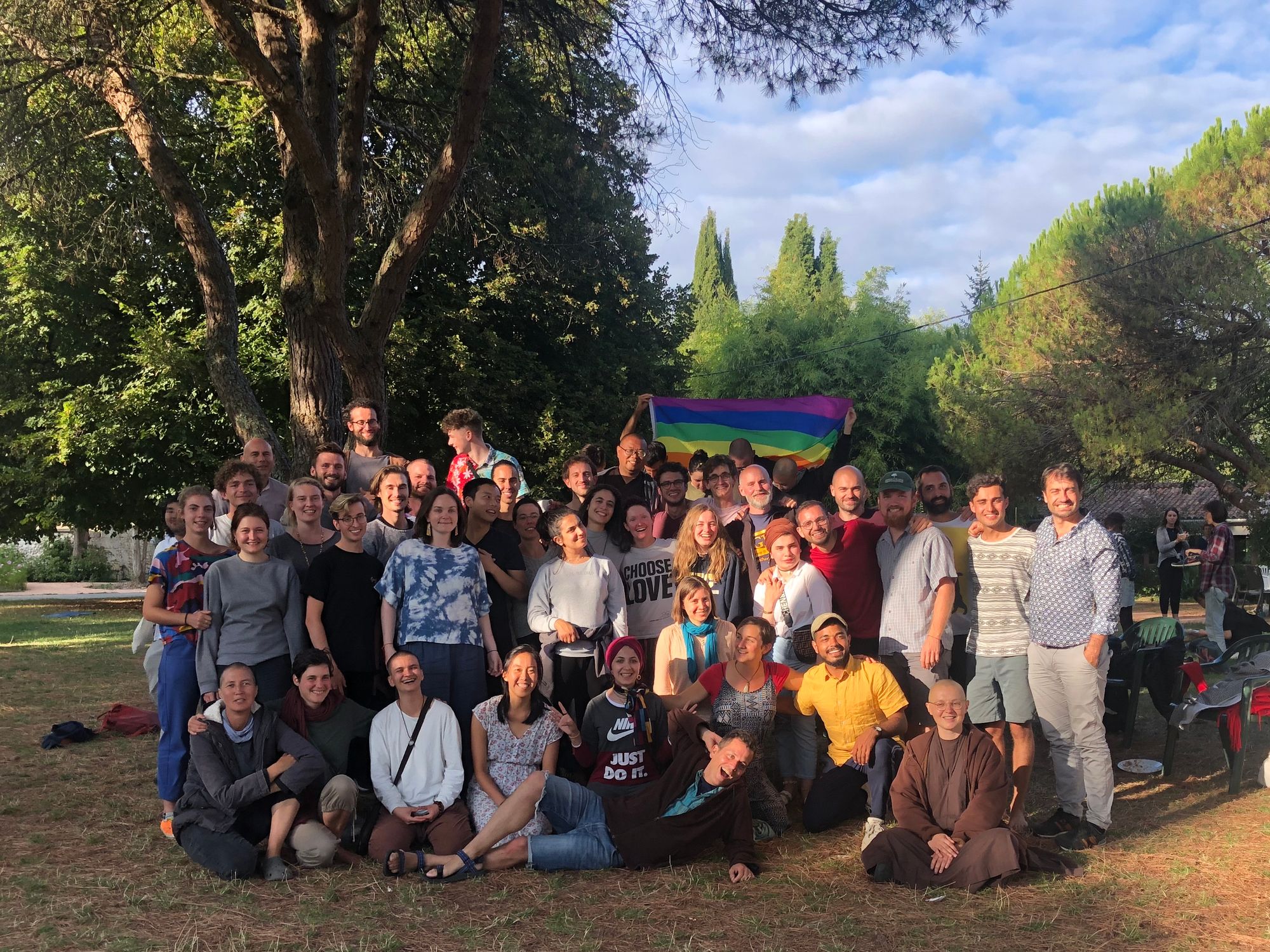
Witnessing the 5 Mindfulness Trainings ceremony
On the final morning, young people from all over sat in three lines in the middle of the meditation hall to commit to the five Mindfulness Trainings, the Buddhist vision for spiritual ethics in practice. I was touched that so many Palestinians took the trainings and became part of our lineage. Two of my dear rainbow friends — one who I met at the EIAB, another I bonded with at PV — also took the trainings, and I cried unexpected tears of joy when they joined me in our family circle afterwards. Now, they too are part of my spiritual family.
Hanging out with my Palestinian and Israeli friends
I marveled at seeing my Palestinian and Israeli friends experience Plum Village for the first time. To bear witness to the ferocity, joy, and resilience of Walaa and her sisters, to run into Firas on a walk past the lotus pond, to see Amir and Michel bonding deeply... each moment of being with the Palestinians brought a lightness and joy to my experience of the monastery.
One day, Abdallah and Eyad cooked falafel impromptu for the entire Upper Hamlet community. Another day, all of the Palestinians helped to make three massive pots of maqlouba, a traditional dish of savory rice, deep-fried eggplant, carrots, and potatoes that is flipped upside-down before serving. The entire community sat under the four pines listening to a string solo by Nigel before the bell rang three times, with the invitation to participate in maqlouba meditation.
On the final day of the retreat, we paraded to the garden of Buddhas for the Earth Festival, a series of joyful and creative performances by dharma sharing families. The rainbow family went first, singing a few songs that inspired the whole crowd to stand up and dance wildly. A catchy song that honored Thay was also a fan favorite (sample lyrics from a brother: “I used to make a lot of money, then I met Thay. I used to have hair full and shiny, then I met Thay. Now I’m wearing brown and I know why...because I met Thay, because I met Thay, because I met Thay”). Near the end of the festival, the Palestinians performed dabka, a traditional dance; within a minute, everyone was on their feet, dancing dabka, jumping, and friends started chanting “Free Palestine”. It was a celebration of freedom, the beauty of Palestinian culture, and being alive.
Thank you to everyone who supported me in this project – with kindness and love, financial donations, and words of encouragement! You kept me going through rough times applying for Palestinian visas, waiting for Plum Village funds, and organizing multiple plane journeys. I am very grateful for you, my friends.
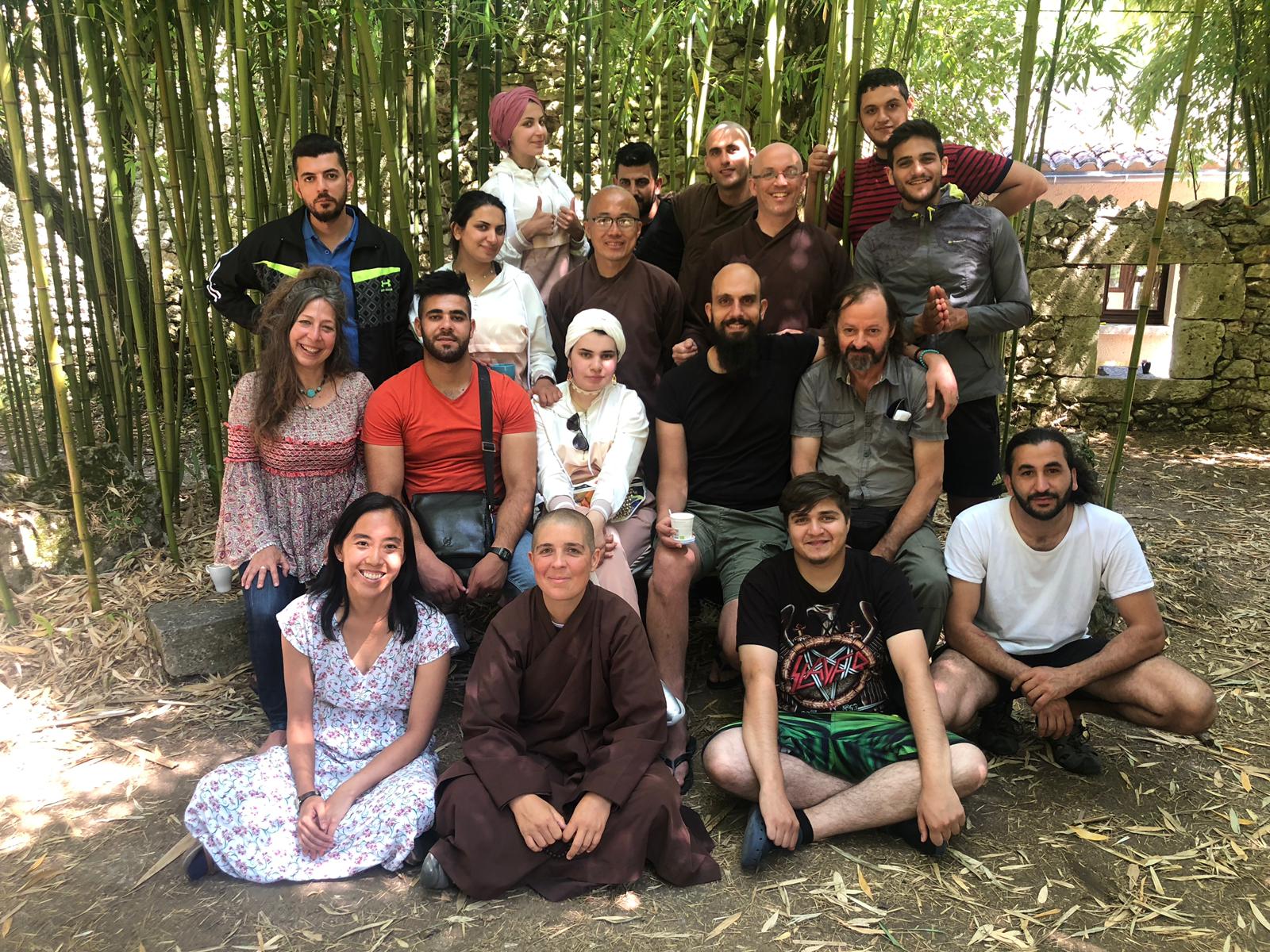
Looking for new consulting projects in social good + tech
I landed in London after two weeks in Plum Village, energized and ready to dive into tech consulting work with my startup client. By the second week, I learned that my tech consulting contract would not be renewed past August. The news came as a surprise: the managing director had recently told me that I’d be promoted to Director of Engineering in September and CTO in 2020. I had dreamed about getting a UK visa and moving to London to work with the team full-time. On this understanding, I’d even hired a Palestinian software engineer to help me with a new React/Redux project.
When I heard the news and rationale from the managing director -- a desire to centralize team members and decision-making in London, the costs of my contract -- I touched disappointment and fear deep in my body.
I can no longer imagine an easy move to London, take refuge in the stability of a remote consulting gig, or give so generously to my projects in Palestine. I may need to source another tech client in Tel Aviv, London, or the states, and to fundraise for my school instead of fronting salaries myself. I am floating in the black hole of possibility and fear.
In this place without stable income, I am exploring the edges of my being. Anything is possible, and my challenge will be to set an intentional path forward for financial sustainability. I'm declaring my intentions to the universe to see what will manifest. Here's what I'd like to optimize for:
- Building things at the intersection of social good and technology;
- Values alignment and a company with a social mission;
- A flexible working schedule that allows me to build my trade school during the day (or building my school becomes paid work!);
- Creating new opportunities for Palestinian software engineers; and
- Growth as a leader and technologist.
Dear friends, if you have any ideas for me, please send them my way. I'm curious and open to exploring different ways to nurturing these aspirations in practice.
And finally, some thoughts on the wind in Northern Ireland
Walking these cliffs, I am at the mercy of the wind. She weaves her own path along the cliffs of the Causeway Coast, taking no notice of me or the other humans trekking towards the stones. She rushes past me, and I imagine her insistent, daring, urging my limbs to follow. I resist, grounding my feet into solid earth. When the wind subsides, I lift my left foot, plant, shift my weight forward. Then my right foot. In one step and then another, I make my way along the cliff path lined by blackberry vines and lavender flowers, down to the basalt stones called the Giant’s Causeway.
A fierce storm is brewing. I am one of the only souls who have not turned back towards the Visitor’s Center. The visitors are all clustered near the Giant’s Gate, a wall of hexagonal columns along the right side of the causeway. I cross the entryway and head for the middle of the causeway, the one with the wishing seat.
I am the lone person sitting on the causeway, looking out into the vast ocean. The waves are rolling in, crashing against the rocks and scattering cocoa-colored foam into the sky. The wind clears me of all thoughts and ideas. My body is fully immersed in finding stability, shifting imperceptibly to keep its balance.
Maybe this is what the start of a tornado feels like, wind meeting human in a test of willpower. Dear human, will you surrender to this strength of nature? Or will you resist?
When does my resistance give way to surrender? When I recognize that there is something greater than me, that this force of nature is capable of tossing me into the sea. In this flow between resistance and surrender, humility arises naturally. I don’t have the ability to fight an emerging tornado, I must move to safe ground.
The windstorm forces me to surrender to the way things are, rather than longing for the way they “should” be. The response to a storm is to take shelter, drink tea, warm up my limbs in a hot shower. I don’t blame the sky for its behavior or myself for a lack of strength; acceptance arises and humility follows with ease.
Recent interactions with friends has motivated me to examine this flexibility (or lack thereof) in my human relationships. Here, I struggle to adapt to the changing state of the present moment. I often cling to judgment about the way things “should” be, and problem-solve towards that end: identifying boundaries for future interactions to stay safe and prevent harm. Yet if I'm not careful, these strategies create barriers to connection with people I love.
Imagine if I told the wind it could never rush by me or the rain not to fall! The wind is the wind, and my friends are who they are, with their surprises and difficulties.
Can I see with patience the windstorm, knowing that the calm blue sky is yet to emerge? Can I see with patience the difficult human behavior, knowing that the right conditions will give rise to love and understanding?
The wind reminds me to be patient and humble, and to let things be as they are.
